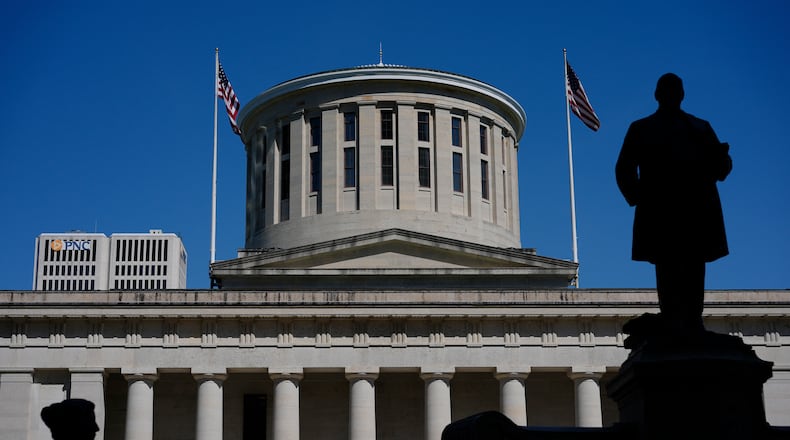A previous iteration of the bill died in that chamber last general assembly, but new House Speaker Matt Huffman, R-Lima, projected a quiet confidence to reporters Wednesday about the bill‘s future.
The bill
Senate Bill 1, hashed out over the past several years, is an ambitious overhaul of Ohio’s 14 state universities and 22 community colleges. On Tuesday, the bill drew over 800 submissions of opposition testimony and produced an eight-and-a-half hour committee hearing. Prior hearings brought just over a dozen proponents.
The bill would, among other things:
- Ban diversity, equity and inclusion initiatives on campus and force current DEI initiatives to close;
- Allow the state to withhold funds for non-compliance with the bill;
- Require universities to “Affirm and declare that the state institution will not encourage, discourage, require or forbid students, faculty, or administrators to endorse, assent to, or publicly express a given ideology, political stance, or view of a social policy, nor will the institution require students to do any of those things to obtain an undergraduate or post-graduate degree;”
- Require students to take a state-designed American civics or history class before being awarded a bachelor’s degree;
- Automatically eliminate any university degree program that awards fewer than five degrees per year on a three-year rolling average;
- Prohibit full-time university faculty from striking;
- Require state training for university trustees and reduce trustee terms from nine years to six.
Floor debate
Proponents of S.B. 1 remained steadfast Wednesday, less than 24 hours after the marathon hearing against it.
Sen. Jerry Cirino, R-Kirtland, who champions the bill, told his Senate colleagues that he no longer believes state universities should be left to their own devices in creating an open and fair environment on campus.
Cirino has drawn attention to conservative college students feeling the need to self-censor on campus in order to protect their grade or fit in socially. He said many students, faculty and university trustees told him they were afraid to support S.B.1 publicly, which he said “further makes the case here.”
“Academia has had plenty of opportunity to make changes and adjustments… but generally, they have not risen to the occasion, so it is an opportunity to act and force change and reform to happen," Cirino said.
He argued it’s more important than ever to rectify dwindling public confidence in Ohio’s universities and community colleges, which he said is at a historical low. Cirino also doubled down on his belief that S.B. 1 would create more opportunities for speech, not less, and said the measure would foster a “true diversity of thought on campus and reject the single orthodoxy of belief that is rampant on so many of our campuses.”
Democrats, meanwhile, were unconvinced.
“I really disagree with the premise of this bill — that we have to destroy a liberal bias that I do not believe exists, at this moment,” Minority Floor Leader Nickie Antonio, D-Lakewood, said.
Democrats framed S.B. 1 as a government overreach. Common in their arguments was that the bill’s strike ban interferes with worker rights; that giving the legislature power to withhold finances based on subjective assessments of compliance is misguided; and that placing such tight government oversight on public university matters would dissuade faculty and students from Ohio’s public universities.
Sen. Willis Blackshear Jr., D-Dayton, called the bill “a direct attack on academic freedom and the integrity of Ohio’s higher education system” in a statement after the vote.
“By imposing political restrictions on universities, undermining diversity initiatives, and interfering with the rights of faculty, this bill threatens the quality of education our students receive,” Blackshear said. “Ohio’s colleges and universities should be places where students learn to think critically and engage with diverse perspectives — not where politicians dictate what can and cannot be taught.”
Cirino, meanwhile, argued that DEI initiatives had become a “debacle.”
“It has morphed into institutional discrimination,” Cirino said. “It has resulted in students, staff and faculty experiencing discrimination if they do not fit the orthodoxy of DEI. This discrimination must end along with the millions of dollars that have been spent supporting these often very large organizations.”
The bill does not define what constitutes a diversity, equity or inclusion initiative.
Immediately after the votes came down, a group of student protestors sitting in the Senate chamber began chanting: “Who killed higher ed? The Ohio Senate did.”
For more stories like this, sign up for our Ohio Politics newsletter. It’s free, curated, and delivered straight to your inbox every Thursday evening.
Avery Kreemer can be reached at 614-981-1422, on X, via email, or you can drop him a comment/tip with the survey below.
About the Author

